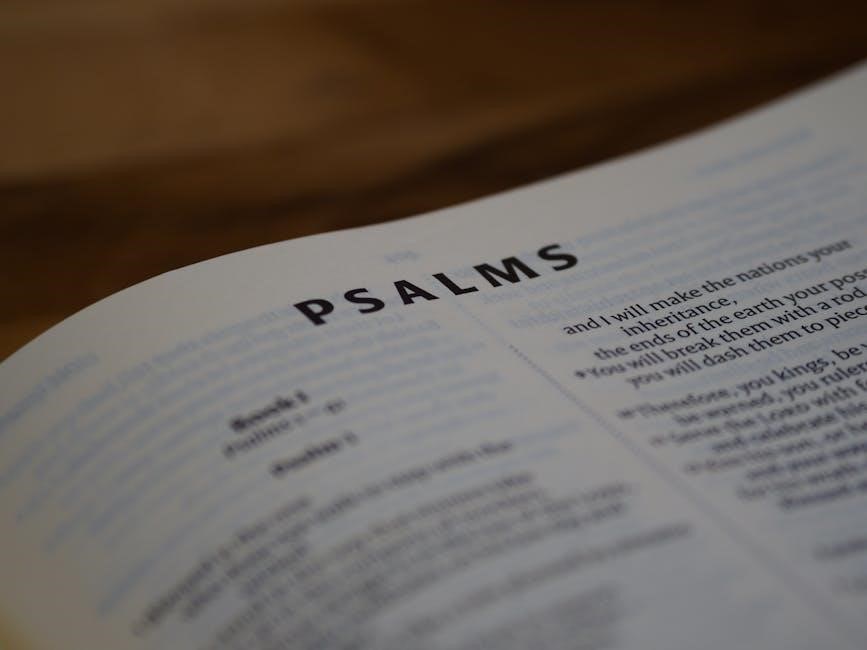The Book of Psalms, the Bible’s longest book, is a timeless collection of poetic prayers, hymns, and meditations. Its 150 chapters offer spiritual guidance, emotional depth, and divine connection, making it a cornerstone of worship and personal devotion for centuries.
1.1 Overview of the Book of Psalms

The Book of Psalms, comprising 150 chapters, is a comprehensive collection of poems, songs, and prayers reflecting diverse emotions and spiritual experiences. Spanning various eras in Israel’s history, it includes hymns, laments, and thanksgiving songs. This sacred text serves as a foundational element in worship and personal devotion, offering solace and inspiration across generations and cultures.
1.2 Importance of the Book of Psalms in Religious Texts
The Book of Psalms holds profound significance as a cornerstone of Jewish and Christian worship. It is the most-quoted Old Testament book by Jesus and serves as a primary source for liturgical and devotional practices. Its rich emotional and theological depth resonates universally, offering comfort, guidance, and inspiration. This sacred text bridges human experiences with the divine, making it indispensable in religious traditions and personal spiritual journeys.

Composition and Authors
The Book of Psalms comprises 150 poems and songs attributed to various authors, primarily King David, along with Asaph, the Sons of Korah, and others, spanning centuries.

2.1 Major Contributors and Their Roles
King David is the most prominent author, contributing 73 psalms, while Asaph and the Sons of Korah also played significant roles. Other contributors include Solomon and anonymous writers, reflecting diverse perspectives and periods in Israel’s history, enriching the theological and emotional depth of the collection.
2.2 Historical Context of Composition
The Psalms were composed over several centuries, spanning periods of monarchy, exile, and restoration. Many psalms reflect historical events, such as David’s reign, while others express communal worship and personal devotion. The collection captures Israel’s spiritual journey, blending royal hymns, prophetic reflections, and liturgical songs, making it a dynamic witness to the nation’s evolving relationship with God across generations.
Categories of Psalms
The Psalms are categorized into hymns, laments, thanksgiving psalms, penitential psalms, songs of trust, and imprecatory psalms, each reflecting diverse emotions and spiritual themes.
3.1 Classification into Hymns, Laments, and Thanksgiving Psalms
The Psalms are categorized into hymns, laments, and thanksgiving psalms, each serving distinct purposes. Hymns, like Psalm 100, celebrate God’s greatness with joy. Laments, such as Psalm 13, express sorrow and pleas for divine help. Thanksgiving psalms, including Psalm 30, reflect gratitude for God’s deliverance, showcasing a spectrum of human emotions and spiritual experiences.
3.2 Exploring Less Common Categories
Beyond the familiar hymns and laments, the Psalms include less common categories like penitential psalms, which express remorse, and imprecatory psalms, calling for justice or judgment. Songs of trust, such as Psalm 23, emphasize faith in God’s protection. These diverse forms enrich the spiritual landscape, offering deeper insights into human struggles and divine relationships, as highlighted in various PDF studies of the Psalms.
Liturgical Use
The Book of Psalms has been a cornerstone of worship, historically used in Jewish and Christian services. Today, Psalms like Psalm 23 remain integral to liturgical practices, offering comfort and spiritual connection in both traditional and modern contexts.

4.1 Historical Use in Worship Services
The Book of Psalms has historically been central to Jewish and Christian worship, serving as a divine source of prayer, praise, and communal reflection. Ancient Israelites used Psalms in Temple rituals, while early Christians incorporated them into liturgical practices; Specific Psalms, like Psalm 23, have been traditionally used in funerals and times of mourning, reflecting their enduring emotional and spiritual resonance across centuries of worship traditions.
4.2 Modern Applications in Liturgy
The Book of Psalms remains a vital part of modern liturgy, with digital PDF versions enhancing accessibility. Psalms like 23 and 46 are widely used in contemporary worship, personal devotion, and communal prayer. Their timeless themes of trust, hope, and praise continue to resonate, making them indispensable in both traditional and modern spiritual practices, bridging ancient traditions with today’s tech-driven world.
Themes and Messages
The Book of Psalms explores universal themes like trust, redemption, and divine mercy, offering comfort and guidance. Its messages transcend time, resonating with readers seeking spiritual and emotional solace.
5.1 Central Themes in the Psalms
The Psalms delve into trust, redemption, and divine mercy, emphasizing hope and justice. They express a range of human emotions, from sorrow to joy, while highlighting the depth of the human-God relationship and the resilience of faith. These themes, woven throughout the Psalms, offer timeless guidance and inspiration, resonating universally across cultures and generations.
5.2 Universal Messages for Contemporary Readers
The Psalms offer timeless wisdom, addressing universal human experiences like trust, hope, and divine guidance. Their emotional depth resonates with modern readers, providing comfort and solace. Themes of resilience, forgiveness, and God’s faithfulness inspire personal reflection and spiritual growth, making the Psalms a vital resource for navigating life’s challenges and fostering a deeper connection with the divine.

The Book of Psalms in PDF Format
The Book of Psalms in PDF format offers a convenient and accessible way to explore its timeless teachings, prayers, and hymns, ideal for personal reflection and study.
6.1 Benefits of Digital Access
Digital access to the Book of Psalms in PDF format provides unparalleled convenience, enabling readers to carry the entire text on devices like smartphones, tablets, or laptops. This portability ensures easy access for personal study, worship, or sharing. Additionally, digital tools allow for quick searches, highlighting, and note-taking, enhancing both personal reflection and group discussions. This modern approach bridges tradition with innovation, making the Psalms more accessible than ever.
6.2 Popular PDF Resources and Translations

Popular PDF resources for the Book of Psalms include versions from BibleGateway, StudyLight, and eBook platforms. Translations like KJV, NIV, ESV, and NKJV are widely available. These digital editions often include study notes, commentary, and cross-references, enhancing deeper understanding. They are accessible on various devices, making it easy to explore different interpretations and linguistic styles of the Psalms.

Effective Study Using PDFs
Effective study using PDFs allows for easy navigation, highlighting, and access to multiple translations, enhancing meditation and reflection on the Psalms’ rich, deep content.
7.1 Tools and Methods for Digital Study
Digital tools like PDF readers with search functions and annotation capabilities enhance Psalms study. Bible study software and apps provide verse comparisons, commentary access, and note-taking features. These methods enable deeper engagement, allowing readers to cross-reference, highlight, and meditate on specific verses efficiently. PDFs also offer portability, enabling study anywhere, making spiritual reflection more accessible and convenient for modern learners.
7.2 Enhancing Study with Digital Features
Digital features like search functions, annotations, and hyperlinks enhance Psalms study by making it interactive and accessible. PDFs with commentary, cross-references, and study notes provide deeper insights. These tools empower readers to explore themes, compare translations, and engage with the text more meaningfully, fostering a richer understanding and connection to the Psalms in a convenient and user-friendly format.
Modern Relevance
The Book of Psalms remains a vital source of comfort, inspiration, and guidance, offering timeless wisdom for personal reflection and communal worship in today’s fast-paced world.
8.1 Application in Personal Devotion
The Book of Psalms is a cornerstone of personal devotion, offering comfort, inspiration, and guidance for believers. Its timeless verses provide solace in times of sorrow, joy in celebration, and wisdom for life’s challenges. Many turn to specific psalms, like Psalm 23 for reassurance or Psalm 46 for trust, making it a vital resource for daily reflection and prayer. The availability of Psalms in PDF formats enhances accessibility, enabling individuals to easily carry and study these sacred texts, fostering a deeper connection with faith and spiritual growth.
8.2 Role in Academic and Theological Studies
The Book of Psalms is a foundational text in academic and theological studies, offering insights into ancient Israelite religion, poetry, and culture. Scholars analyze its themes, historical context, and literary structures to understand biblical theology. PDF resources, including commentaries and analyses, facilitate deeper study, making the Psalms a vital tool for exegetical and hermeneutical research, enriching both academic inquiry and theological discourse.

Cultural Impact
The Book of Psalms has profoundly shaped art, music, and literature, inspiring countless works across cultures. Its themes of hope and faith continue to resonate universally, fostering spiritual and creative expression.
9.1 Influence on Art, Music, and Literature
The Book of Psalms has profoundly influenced art, music, and literature. Its lyrical and spiritual depth has inspired countless hymns, musical compositions, and literary works across cultures. Artists have depicted its themes in various mediums, while writers and composers continue to draw from its rich emotional and theological tapestry. This timeless inspiration reflects the Psalms’ universal appeal and enduring relevance.
9.2 Cross-Cultural Significance
The Book of Psalms transcends cultural boundaries, resonating with diverse faiths and traditions. Its themes of trust, forgiveness, and praise are universally relatable, making it a shared spiritual resource. From Jewish liturgy to Christian worship, the Psalms bridge cultural divides, offering comfort and inspiration to people worldwide. Their timeless messages adapt to varied contexts, fostering unity and understanding across generations and nations.
The Book of Psalms remains a timeless source of comfort, inspiration, and spiritual growth. Its enduring relevance shines through its availability in PDF, making it accessible to all.
10.1 Summary of Key Points
The Book of Psalms, comprising 150 chapters, is a rich collection of prayers, hymns, and meditations. Its themes of trust, redemption, and praise resonate universally. Available in PDF, it offers accessible study tools, enhancing devotion and theological exploration. Its historical and modern relevance underscores its enduring impact on worship, personal faith, and cultural influence, making it a cornerstone of spiritual growth and reflection for diverse audiences globally.
10.2 Final Thoughts on the Book of Psalms
The Book of Psalms stands as a timeless treasure of faith, emotion, and wisdom. Its 150 chapters encapsulate the human experience, offering comfort, guidance, and praise. As a PDF resource, it remains accessible and relevant, bridging ancient truths with modern devotion. Its enduring legacy as a spiritual guide and literary masterpiece ensures its continued impact on hearts and minds across generations.
